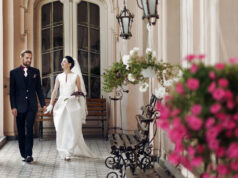When it comes to planning a wedding, the location can make all the difference—not just in terms of the backdrop for your special day, but also for your budget. Europe, with its diverse cultures and landscapes, offers a plethora of options for lovebirds. However, the cost of saying ‘I do’ can vary considerably between Eastern and Western Europe. In this article, we delve into the nitty-gritty of wedding expenses across the two regions, providing couples with essential insights to plan their dream wedding without financial nightmares.
▶️ Read also: Hidden costs in planning a destination wedding in Europe
The budget spectrum
Embarking on the journey of marriage is a momentous occasion, and the setting you choose can significantly impact the budget of your nuptial celebrations. Europe presents a striking contrast in wedding costs, broadly categorized by the compass points of east and west. Couples looking to tie the knot in Western Europe should be prepared for a steeper price tag. The allure of historic cities like Paris, Venice, and London comes with a premium due to higher living costs, more expensive services, and a reputation for luxury.
The splendour of a Western European wedding often includes iconic venues such as French châteaux, Italian villas, and grand British estates, each providing an unforgettable backdrop at a correspondingly high cost. This opulent setting might necessitate a larger budget, as couples may find themselves navigating the upper echelons of the wedding market, where exclusivity is often a key selling point.
In contrast, Eastern Europe offers an attractive proposition for couples who are cost-conscious without compromising on the cultural and historical richness of their wedding experience. Nations like Poland, the Czech Republic, Hungary, and the Baltics have seen a rise in popularity as wedding destinations, thanks in part to their comparatively lower costs. While these regions still boast a wealth of beautiful venues—from medieval castles to rustic wineries—their services and products are often more affordable.

This cost efficiency extends beyond venue hire to encompass catering, accommodation, and ancillary services, meaning the dream of a fairytale European wedding can be realized at a fraction of the cost. However, it’s important to note that ‘affordable’ does not imply a lack of quality; many Eastern European countries offer exceptional value for money, with high standards of service and a welcoming atmosphere for guests, allowing for a lavish celebration that could extend over several days.
Venue and Accommodation Costs
One of the largest expenses of a wedding is the venue. In Western Europe, a château in France or a villa in Italy can cost anywhere between €8,000 to over €20,000. Compare this to Eastern Europe, where renting a historic manor in Poland or a picturesque vineyard in Slovenia might set you back as little as €1,500 to €5,000.
Accommodation also mirrors this disparity. A five-star hotel in Western European capitals like Paris or Rome could cost upwards of €300 per night, while similar luxury in Budapest or Prague could be found for around €150.
Catering and Cuisine
On the flip side, Eastern Europe offers a rich tapestry of flavors that are deeply rooted in local traditions, often representing the heart of the region’s hospitality. Here, the wedding feast is typically generous, featuring a bounty of dishes that can range from hearty meat platters to delicate pastries, all indicative of the region’s diverse culinary heritage.
The approach to wedding catering in these parts of Europe is frequently characterized by an emphasis on abundance and variety, with a focus on satisfying and impressing guests through taste and presentation. Despite the lavish spreads, the cost per head remains more economical, ranging from €30 to €100 – here is an example in Budapest.
This affordability can be attributed to lower operational costs and the regional economic climate, but it doesn’t detract from the quality or the expansiveness of the dining experience. The result is a celebration that indulges the senses, invites communal enjoyment, and honors the couple’s union through a feast that encapsulates the spirit of Eastern European generosity and warmth.
▶️ Read also: Dealing with dietary requirements at a European wedding
Photography and videography
Capturing the day’s moments is essential. In Western Europe, professional wedding photographers and videographers may charge between €2,000 to €4,000 for their services. In Eastern Europe, the same level of expertise can be found for €1,000 to €2,500, presenting a significant saving for those on a tighter budget.

Decoration and flowers
The cost of decorating your chosen venue and buying flowers also differs significantly. Western Europe is known for its high-end florists, and elaborate decor can easily exceed €2,000. In Eastern Europe, the cost for similar arrangements can be up to 50% less.
Entertainment and extras
Entertainment and the various extras that come with it play a crucial role in setting the tone and creating lasting memories of a wedding day.
In Western Europe, entertainment options are as varied and sophisticated as its locales. Couples might opt for classical quartets in the acoustically blessed halls of Vienna, jazz bands in the cosmopolitan hubs of France, or high-end DJs spinning the latest hits in the pulsating heart of London’s party scene. The cost of such entertainment reflects the prominence of the artists and the demand for their services in these affluent regions. Prices can start at around €500 for simpler arrangements but can quickly escalate to over €2,500 for sought-after bands or exclusive performances that often include additional aspects such as lighting, stage setup, and sound engineering.
The price tag is justified by the quality and expertise of the performers, who are usually seasoned professionals, capable of delivering a high-energy performance that’s tailored to the couple’s preferences.
In Eastern Europe, the entertainment scene offers equally rich, albeit less costly, options. It’s not unusual to find local bands that combine traditional music with modern rhythms, creating a unique soundscape that gives guests an authentic taste of the region’s musical heritage. DJs, too, provide an eclectic mix, with many capable of accommodating a vast array of international music tastes.
Due to the lower cost of living and the burgeoning creative scenes in cities like Prague, Budapest, and Krakow, couples can secure first-rate entertainment that fits a more modest budget, with prices ranging from €300 to €1,500. Despite the lower costs, the quality of entertainment is high, often featuring musicians who tour internationally but come at a lower price point due to regional economic scales.
Additionally, many of these entertainers offer comprehensive packages that include extras like basic lighting and sound systems, which can be less common in Western Europe without an additional fee. This affordability allows couples to splurge on other elements of their wedding or extend the duration of their celebrations, perhaps including traditional dancers, firework displays, or interactive experiences for their guests, ensuring a festive and vibrant atmosphere that lingers well into the evening.
Legal and administrative fees
There are also legal and administrative fees to consider. These can be surprisingly similar across Europe, but it’s always wise to check the local requirements as some countries offer cheaper options for civil ceremonies compared to others.
Practical tips for cost-saving
Cost-saving does not necessarily mean compromising on quality or the overall experience. It’s about making informed choices that align with your financial comfort without diminishing the joy and celebration of your union. Here are some practical tips to help you save costs while still creating a memorable event.
🗓️ Flexible scheduling: One of the most effective cost-saving strategies is flexibility in your wedding date. Opting for a weekday wedding can lead to significant savings as venues and suppliers often offer lower rates outside the competitive Saturday slot. Additionally, consider the season when you plan to wed; marrying in the off-peak season could see costs reduced by up to 20-30%. The off-peak seasons can vary depending on the country, but they generally include the colder months and weekdays at any time of the year.
🔎 Embrace local flair: Leveraging the local produce, cuisine, and floral arrangements not only infuses local charm into your wedding but can also cut down on costs. Imported flowers and ingredients carry a premium, so by choosing a menu that uses seasonal and locally sourced items, you can save a considerable amount. Furthermore, local does not only mean food and decor, but also hiring local bands and photographers can reduce expenses linked to travel and accommodation typically required for bringing in vendors from afar.
💍 Extended engagement: An extended engagement can be financially beneficial. It provides more time to source quotes, compare prices, and book services. Many venues and suppliers offer early bird discounts, so booking well in advance can lock in lower prices. This also opens up the opportunity to DIY certain aspects of the wedding. Crafting your own invitations or decorations not only adds a personal touch but can also trim costs considerably.
🤝 Package deals and negotiation: Don’t shy away from negotiating with vendors for a better price, especially if you’re willing to bundle services. Many suppliers offer discounts for package deals, which might include catering, decorations, and entertainment. Additionally, by consolidating services under one vendor, you might save on logistics and time spent coordinating between different service providers.
Whether you dream of a wedding in the sophisticated cities of Western Europe or the enchanting landscapes of Eastern Europe, there’s an option to suit every budget. The key is to research and plan accordingly, taking into account the significant cost differences outlined in this comparison. With smart planning and a little creativity, you can have the European wedding of your dreams at a price that doesn’t break the bank.






